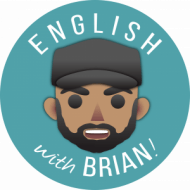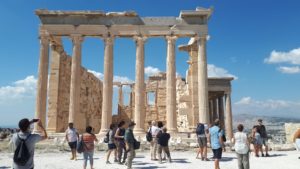Check out my first ever podcast that I recorded back in 2019! In this episode, I talk about how I decided to become an English teacher.
- Try listening to the episode first without reading the transcript.
- After you’ve done that, check the transcript to find any words that you might have missed.
- You’ll also find a quiz at the end!
Transcript:
Hi, this is the first episode of the podcast. So I thought it would be a good idea to start by introducing myself to you; talking a little bit about who I am, how I became an English teacher and what I hope to do with this podcast. So, my name’s Brian, I’m 30 [33 now! 😒] years old. I was born and raised here in Los Angeles, California. I studied art in college. I completed my bachelor’s degree in digital media. And soon after that, I went to Greece. I spent a few months in Greece traveling and I had an epiphany, you could say. I realized that I really wanted to do something that would help other people, and also connect me with people from all different cultures and people from all different countries around the world. When I returned to the US, I wasn’t really sure what I wanted to do. I just knew that I wanted to do something different. So I found a job teaching art classes to kids in elementary school as a part of an after-school program. And I found that I really enjoyed teaching and I really enjoyed working with these kids. So I knew that I was getting closer to something—to finding something—that I really enjoyed.
(FYI:I am not the handsome art teacher in this photo.)
Also during this time, I was still in love with Greece, the food, the culture, the people, the music. So I was determined to learn Greek, to become as fluent as I could. So I was studying all the time and meeting people online to do language exchanges, where they would teach me some Greek and I would teach them some English. They would send me their homework and I would correct it. And I often found myself teaching pronunciation, vocabulary, grammar, and helping them prepare for exams and interviews. So I ended up helping a lot of people get into college, pass their exams, or start their master’s programs. And I found that I really enjoyed teaching English. Soon after that, I decided to complete my certification to teach English as a second language. And the rest is history as I’ve been an online English teacher for the past three years.
So now that I’ve introduced myself to you and talked about how I became an English teacher, I’d like to talk about the podcast. So the main reason that I wanted to create this podcast was to provide a free resource for English language learners. I have planned to share with you several exercises to help you improve your fluency in English, such as pronunciation, drills, listening exercises, and explanations of phrasal verbs and idioms. I also want to cover a variety of topics such as American culture and etiquette . But the most exciting thing for me is to be able to interact with you so you can participate by recording your questions for me at anchor.fm/EnglishWithBrian, so that you can be part of a future episode.
(My teaching setup is much better than this…😋)
All right. Now, it’s time to review some of the key phrases from today’s episode. The three phrases that we’ll be looking at today are: “born and raised in”, “I had an epiphany”, and “the rest is history”.
In today’s episode, I said that I was born and raised in Los Angeles, California. So we used this phrase, “born and raised”, to emphasize that we have a connection to a certain place; that that location or a city shaped, informed, or influenced the person that you are — and also that you’re a true native of that city. For example, if someone said, “I live in Canada, but I was born and raised in Tokyo, Japan”, that would imply that that person grew up in Tokyo and has a strong connection with that city.
When talking about why I became an English teacher, I said that I had an epiphany in Greece. An epiphany is a moment in which you suddenly see or understand something in a new or very clear way. For example, “after John read that book, he had an epiphany and decided to change his life”.
After I finished telling you about how I became an English teacher, I said, “the rest is history”. When someone says “the rest is history”, that means that you already know how the story will end. So the speaker doesn’t need to finish the story. In this case, you already know that I’m an English teacher, so I didn’t need to tell you.
So which city were you born and raised in? What’s the biggest epiphany you’ve ever had? Well, that’s it for today. I hope that was helpful. And I’ll see you next time.

















